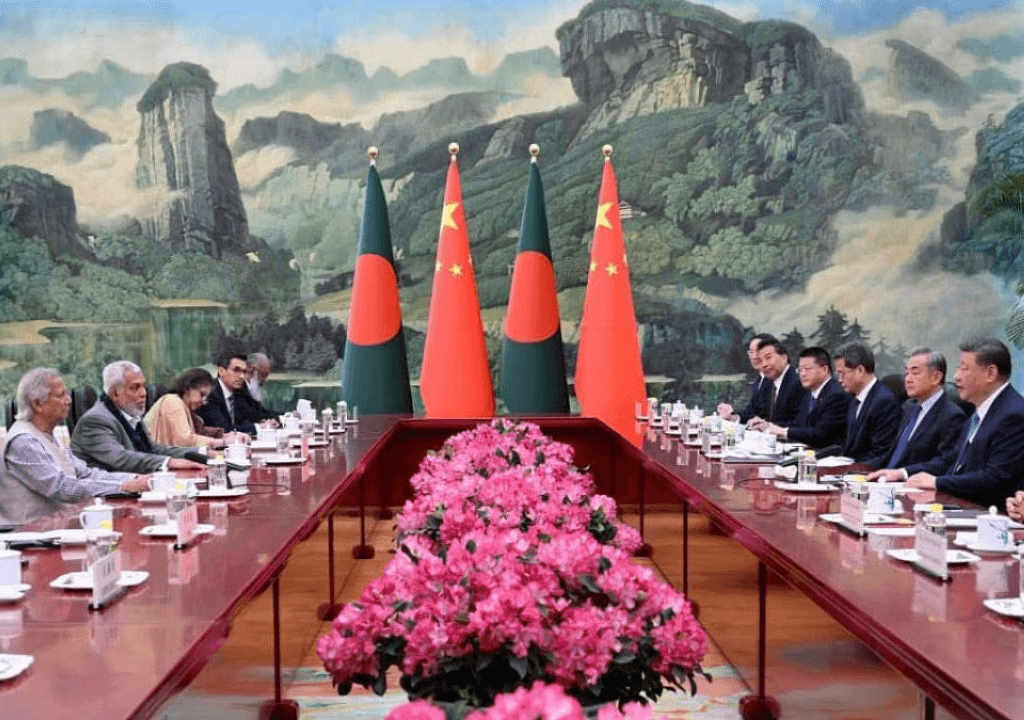Bangladesh’s interim government has harbored resentment toward India from the outset, frequently expressing its hostility through political actions and rhetoric on social media. From symbolic gestures—such as placing Indian flags beneath their feet—to inflammatory online discourse, nationalist factions in Bangladesh regularly voice their disdain for India, despite its crucial role in the country’s independence.
With relations with India strained and facing economic, demographic, and cultural challenges, Bangladesh has consistently sought external support. A decade ago, Pakistan might have been a viable ally, but its internal crises have rendered it ineffective. The West, which once backed efforts to unseat the Hasina government, now maintains its distance, wary of provoking Bangladesh’s growing Islamist factions. Russia, reluctant to jeopardize its strong ties with India, has similarly refrained from direct involvement—leaving China as the most viable alternative for Dhaka’s new leadership.
As the geopolitical landscape of South Asia shifts, Beijing is steadily entrenching itself in Bangladesh, weaving a web of economic and strategic entanglements that grant it a firmer grip on the Bay of Bengal. This maneuvering is more than a matter of regional diplomacy—it is a calibrated challenge to India’s long-standing influence, a quiet but deliberate push to reshape power dynamics in the subcontinent. For New Delhi, the implications are clear. The alignment between Dhaka and Beijing is not just a passing phase but a structural shift, one that threatens to redefine the balance of power.
Evolving Bilateral Cooperation with China
After meeting with Muhammad Yunus, the leader of Bangladesh’s interim government, Chinese President Xi Jinping reaffirmed Beijing’s commitment to deepening bilateral ties, emphasizing China’s readiness to elevate cooperation with Bangladesh. According to Yunus office, the trip secured $2.1 billion in Chinese investments, loans, and grants.
A substantial portion of this funding is earmarked for establishing a Chinese Industrial Economic Zone (CIEZ) in Bangladesh, with nearly 30 Chinese companies pledging $1 billion to the project. This aligns with Yunus push for increased private Chinese investment in Bangladesh’s manufacturing sector.
Additionally, China plans to provide a $400 million loan to modernize Mongla, Bangladesh’s second-largest port. Further cooperation on projects like Mongla’s modernization and the potential Teesta River initiative is drawing Bangladesh deeper into China’s Belt and Road Initiative. Discussions also covered water resource management, and Beijing reaffirmed its support for Bangladesh’s efforts to repatriate over a million Rohingya refugees still living in overcrowded camps after fleeing persecution in Myanmar.
For Bangladesh’s interim government, Yunus meeting with Xi was a significant diplomatic breakthrough. While many countries remain hesitant to engage in large-scale agreements with an interim administration, China has shown no such reservations, actively reviving ties that had remained stagnant since the previous government’s fall.
However, a pressing concern is the widening trade imbalance. Bangladesh’s exports to China, primarily textiles, account for only a fraction of the $23 billion bilateral trade volume. In response, China has granted zero-tariff market access to Bangladeshi products, creating new opportunities for industries such as leather goods. Agricultural exports, including mangoes and jackfruits, are already in the pipeline, with the potential for further expansion into China’s vast agricultural market.
Yet, concerns persist over the nature of Chinese investments. Unlike Western economic partnerships, Chinese funding often comes with minimal social or environmental safeguards, raising questions about how much Bangladesh’s labor force and broader population will truly benefit from these deals.
Worsening Bilateral Cooperation with India
India maintained a strong relationship with Sheikh Hasina’s government, but her departure has disrupted cross-border ties. This shift became evident when Muhammad Yunus chose China for his first state visit, despite reports suggesting that he initially sought to visit New Delhi first.
According to Yunus press secretary, Shafiqul Alam, the interim government had formally requested a bilateral visit to India as early as December last year—weeks before finalizing the trip to China. However, India did not respond favorably. Meanwhile, speculation remains that Indian Prime Minister Narendra Modi, known for his Hindu nationalist stance, may explore engagement with the Yunus administration, despite growing allegations of violence against Hindu minorities.
Analysts suggest that Bangladesh’s interim government is aware of the strategic imperative to maintain stable relations with India. Bangladesh is equally important for India, both as a regional partner and a key player in maintaining stability in South Asia. Modi’s recent meeting with Yunus during a major regional summit underscored ongoing cooperation, and his Independence Day message to Bangladesh’s leadership reaffirmed the significance of strong bilateral ties.
However, tensions persist, exacerbated by Hasina’s continued presence in India. The growing closeness between Yunus and China is likely to further strain relations, deepening the rift between Dhaka and New Delhi.
Future of India-Bangladesh Relations
Given the profound historical and cultural ties between the two nations, the restoration of diplomatic relations remains essential. Yet, the trajectory appears to be diverging. China’s chief interest in Bangladesh lies in its strategic position, a development that poses a considerable risk for India. The Bay of Bengal, a critical extension of the Indian Ocean, serves as India’s most secure maritime domain, anchoring key naval installations along its eastern seaboard.
India’s vulnerability is further compounded by the narrow corridor that connects its mainland to the landlocked northeastern states, a passage running along the Bangladesh border. Any shift in Bangladesh’s geopolitical stance could disrupt India’s regional security strategy. Yunus recent remarks on the issue have heightened concerns in India, fueling growing hostility toward the Bangladeshi government. Meanwhile, similar apprehensions are reportedly rising in Dhaka, further deepening the divide.
India may choose to hold off on any decisive diplomatic moves until after Bangladesh’s elections, with Modi likely to steer clear of direct engagement until a new government is formally in place in Dhaka.








